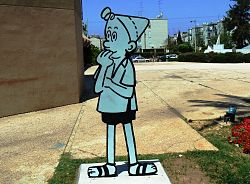
One of the most difficult things I ever did in my life was leave the States and come to Israel, and not only come to Israel, but to a
kibbutz. I'd like to dedicate this post to my first impressions from almost 40 years ago.
When I first came to to Israel in the summer of 1970 it was because I was looking for a cheap vacation - little did I know that this little vacation was to change the whole of my life. I was brought up in a household where Judaism was not a strong issue (to put it mildly). Yes, we celebrated some
holidays - The Jewish New Year (not that I knew what it was), Passover (same comment) and Hanuka (presents!). No Synagogues, Jewish community activities or Jewish Youth Movements for my family. They celebrated these holidays as family obligations, although it seemed to me that they enjoyed themselves. They (read my father) kept himself outside of the Jewish Community. I have been in more Churches in my life than I have in Synagogues.
Anyway, that summer of 1970 was after I had played in an orchestra in
Siena the previous year, and didn't feel like staying in New York City during the summer, so I decided to become a volunteer on a kibbutz - it's a shame I didn't read about Israel beforehand and discover that the heat is Israel was like the heat in New York and that nobody had air conditioning on the Kibbutz. How I got to the kibbutz I'm at today is the subject of another story, but I arrived in this kibbutz, about 7 miles from the
Gaza Strip, which is situated in the beginning of the
Northern Negev Desert.
I was given a single room with an outdoor bathroom and inside two iron beds, one table and one chair. I took one look at this room and my decision to come was shaking - take away the carpets and the curtains and the bedspread

which appear in this picture and you might begin to see what I saw when I first came (there is no connection between this picture and my kibbutz).
Then when I went into the bathroom I saw a huge cockroach with wings (I never saw any of those in NYC) and I was almost on the plane going in the opposite direction. Sheer stubbornness kept me there at that time, because it certainly wasn't a 5 star hotel that's for sure.
For some reason, I and the kibbutz got along, although at that time there were very few volunteers. Most of the members were embarrassed to speak English (not like today in the computer age where everyone knows English) so in some instances I spoke French (heaven help us!). I learnt the language mostly by walking around with a notebook and asking everybody what everything was called. I decided that if I was going to spend the summer in this place, I wasn't going to do it as a
JAP.
I was put to work in various places and eventually ended up in the dining room. I'll give you a few examples of language problems (and there were many) - I was working in the dining room one day and one of the members came to me, gave me pitchers of soda water (jugs to you Brits!) and told me "You must to divide the soda" - After my initial shock, I realized that I just couldn't understand what he wanted until someone explained to me that the word "to divide" in Hebrew ( לחלק) means "to give out" in English. I was meant to put the pitchers of soda water on the tables, and even now when I think about it I still laugh at it.
Another example is about food - in Israel there is a food that orig

inally came from
Yemen called "Schug" "Zhug" - no matter how you spell it it's a very sharp mixture of hot green chillies. Unfortunately for me, it's consistency looks like chopped spinach. One day I went to the dining room to eat and took a large helping of "spinach" and couldn't understand why everybody was looking at me and laughing. Oh how I understood later! But everybody has to learn, and that was my lesson for the day.
Two other shocks I received when I first came to Israel (among the many that I had along the way) - one was discovering that there were Jewish criminals! - (in our house, anybody who was a thief was either a goy and please pardon my very unpolitically correct English a "schvartze"-my father's language, not mine!).
The second thing that really shocked me was the number of soldiers I saw walking around in uniforms with Uzis. I was sure that war was going to break out any minute and what the hell was I doing there. It took me a long time to get used to that. I just don't remember seeing American soldiers on the streets of New York City in uniform in 1970.
After I left at the end of the summer, I remember the plane going over Idlewild airport I think it was called at the time (now JKF airport), and in my mind I saw how the kibbutz members lived in very small houses, with a minimum of furniture, but with grass and trees and small gardens around them, and then I saw Americans (please allow me the generalization), with their dens and 3 car garages and guest living rooms, and all the talk about "what movie did you see" and "which restaurant did you eat in",and "how much money do you make", and all at once I decided that I was living in the wrong country. So that's how I ended up on a kibbutz in the Negev near the Gaza Strip just 7 weeks after being a volunteer there (although meeting my future husband might have just had a little bit to do with it).

















